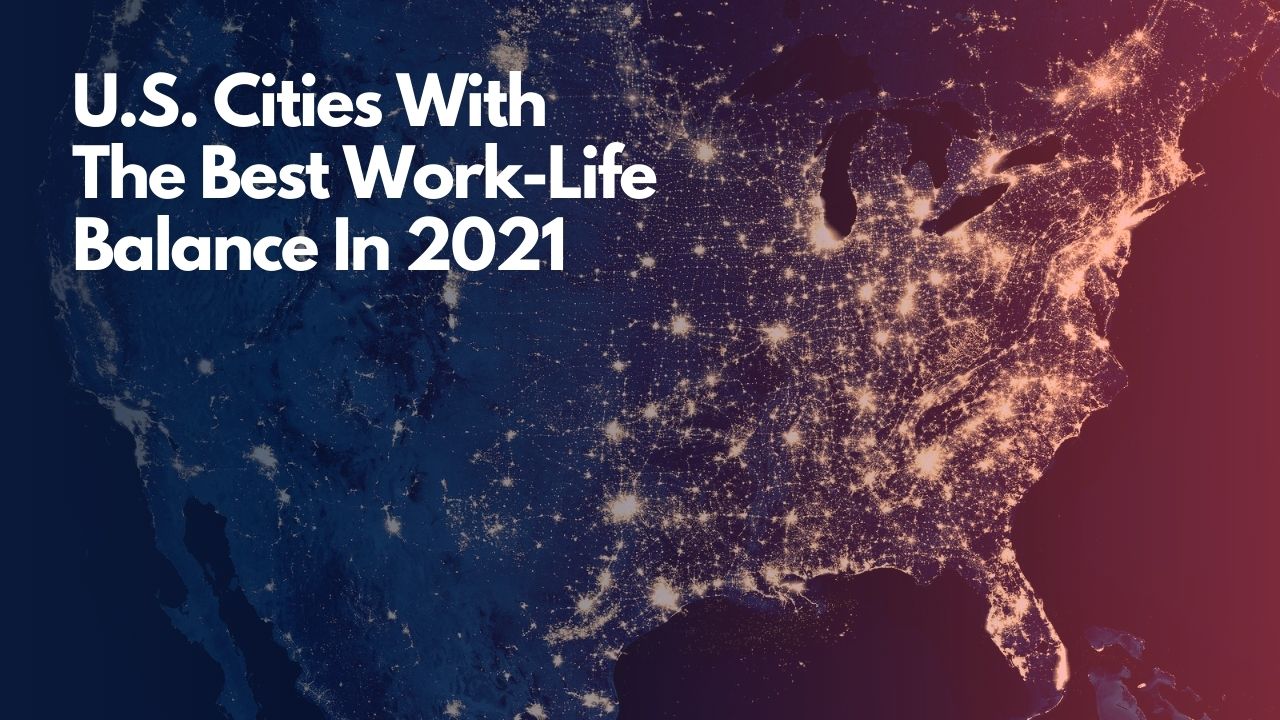- New research from Kisi examines which cities promote the best work-life balance.
- Cities were scored across three categories, with Salt Lake City, Utah, finishing top for the U.S.
- These top cities have been able to navigate shifts in remote work, economic, social, and structural changes to encourage a healthy work life balance.
A recent study released by mobile access technology company Kisi examines which cities promote the best work-life balance.
Rather than serve as a livability index or a ranking of the best cities to work in, the study shows how conditions have shifted since before the pandemic and includes key elements from a previous study on the topic, released by Kisi in 2019.
The study compares data on work intensity, institutional support, livability, and more to rank US Cities as well as global cities that are doing the best at meeting the lifestyle demands of residents to make their city a more attractive place overall to work and live.
The first part of the study evaluated the local working climate in 50 notable cities across the United States, and then compared each city’s rank to its status in 2019.
“It’s interesting to see how cultural expectations around some aspects of work-life balance have changed so dramatically. The past year has brought many challenges but also some positive shifts in how we view the division between our work and lives. For example, a lot of people did not have the usual expenses for traveling or shopping while receiving government support, but at the same time this allowed them to spend more time with their immediate family or pursuing long-ignored personal goals,” comments Bernhard Mehl, CEO & Co-Founder of Kisi.
The top rated American city for 2021 is Salt Lake City, Utah, which achieved a score of 100 out of 100 based on Kisi’s index, despite not being included in their 2019 study.
Here is the full top ten:
- Salt Lake City, Utah
- Portland, Oregon
- Minneapolis, Minnesota
- Colorado Springs, Colorado
- Omaha, Nebraska
- Denver, Colorado
- Honolulu, Hawai’i
- Kansas City, Missouri
- Seattle, Washington
- Sacramento, California
Cities were assessed based on three categories: Work Intensity, Society & Institutions, and City Livability.
Within these categories were factors that researchers identified as contributing to work-life balance, both during and once we are beyond the pandemic. A total of 18 factors were included, scored, and averaged to create the overall ranking for each city in both the global and US assessments.
- For “Work-Intensity,” the following factors were included: Percent of Remote Jobs, Overworked Population, Minimum Vacation Days Offered, Vacation Days Taken, Unemployment, Multiple Jobholders, and Days of Paid Parental Leave Offered.
- The area of Society & Institutions included factors such as Covid Support, Healthcare, Access to Mental Health Resources, as well as scoring around Inclusivity & Tolerance.
- City Livability as a category covered fundamental indicators around: Affordability, Happiness, Culture & Leisure Opportunities, Safety, Access to Outdoor Spaces, Air Quality, Wellness and Fitness, as well as Covid Impact.
The study also looked at a global ranking of 50 cities that included 17 of the same US cities in comparison to 33 cities from around the globe. The international cities selected are known for attracting professionals and families for their work opportunities and diverse lifestyle offerings.
Notably, the city ranked number 1 in the US, Salt Lake City, came in at 24th when evaluated on a global scale.
On why US cities fared so poorly in the index compared to their international counterparts, Mehl said that, “there are fundamental elements to promoting a holistic work-life balance where U.S. cities lagged behind their global counterparts even before the pandemic, for example having poor access to healthcare and mental welfare programs, as well as a working culture where employees do not get enough vacation. The results of this year’s edition show that having a safety net in place for workers made a large difference in how a city navigated the crisis.”
The top 10 cities for work life balance globally of the 50 assessed were:
- Helsinki, Finland
- Oslo, Norway
- Zurich, Switzerland
- Stockholm, Sweden
- Copenhagen, Denmark
- Ottawa, Canada
- Munich, Germany
- Vancouver, Canada
- Amsterdam, Netherlands
- Sydney, Australia
The findings of this study provide insight into how cities around the world navigated the challenges of the past year; and how both pre-existing frameworks as well as newly created support systems helped cities address the working and living needs of their residents. Specifically, it illustrates how some cities have been able to navigate shifts in remote work, economic, social, and structural changes better than others to encourage a healthy work life balance.
Further Reading: https://www.getkisi.com/work-life-balance-2021-usa


 Dr. Gleb Tsipursky – The Office Whisperer
Dr. Gleb Tsipursky – The Office Whisperer Nirit Cohen – WorkFutures
Nirit Cohen – WorkFutures Angela Howard – Culture Expert
Angela Howard – Culture Expert Drew Jones – Design & Innovation
Drew Jones – Design & Innovation Jonathan Price – CRE & Flex Expert
Jonathan Price – CRE & Flex Expert












